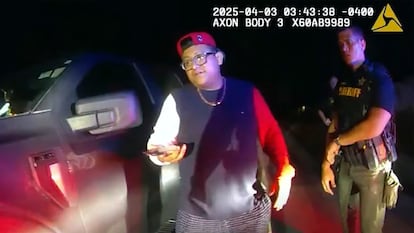Cases of civilians posing as ICE agents to detain migrants are on the rise
A man has been arrested in Florida for impersonating a federal agent after chasing two Latinos who refused to prove their immigration status


It was almost 3 a.m. In a small town called Indiantown, southeast Florida, two Latino migrants were riding in a van on their way to work when a man in a gray pickup truck approached them. The man, wearing pajama pants, a cap on backward, a sweatshirt, and a gold chain, claimed to be an Immigration and Customs Enforcement (ICE) agent and demanded the two men show him their identification. The alleged immigration agent also demanded that the workers prove their immigration status to determine whether they were undocumented or not. After threatening to deport them, the migrants suspected the man wasn’t who he claimed to be, drove off, and called 911.
The reality is that the individual, identified by the Martin County Sheriff’s Office as José Juan Lopez, does not and has never worked for ICE or any other law enforcement agency. Lopez is a 23-year-old man with a criminal record, including charges for possession of a controlled substance, violation of probation, child abuse, and domestic assault. On April 3, he became the latest civilian to pose as an immigration officer to terrify the community amid Donald Trump’s anti-immigration crusade.
Although immigration officials have increasingly been wearing plain clothes when making arrests, the two migrants became suspicious of the man as the interaction unfolded. “They obviously knew something was up. They don’t normally see ICE agents dressed in pajama pants or just jumping out randomly without some sort of real hardcore identification,” Commander Ruben Romero of the county sheriff’s office told local media.
According to Lopez’s arrest affidavit, when the migrants attempted to flee from him in their vehicle, the suspect followed them “for several blocks,” eventually ending up in the parking lot of a local supermarket, where he chased them in circles until authorities arrived. At the time of his arrest, Lopez told officers that he was the victim in this case and that the men who called 911 were actually threatening him, according to body camera video from one of the officers present, which was released to local television station WPBF 25 News.

“There was a group of friends in the car, and they were here trying to threaten me,” Lopez says in the recording. The man, who also called 911 to report the migrants at the time of the incident, claims he chased them because he feared for his life. Although he denies impersonating an ICE agent, he does admit to telling the victims they would be deported. “Because they looked like a bunch of undocumented people,” he adds.
The two migrants who were harassed by Lopez, whose identities have not been released, are not U.S. citizens, according to the sheriff’s office. Local authorities have urged people to report this type of crime, regardless of the victim’s immigration status. In recent months, immigrants — from those with visas and green cards to those without documents — have increasingly been avoiding any type of interaction with authorities out of fear of being detained or even expelled from the country as the Trump administration intensifies its deportation efforts.
A growing phenomenon
These types of impersonations and frauds are not new, but they have experienced a spike during the first months of the Trump administration. Lopez’s case joins a growing list of arrests of individuals accused of impersonating federal agents — a federal crime — across the country. The penalties can include up to three years in prison, a fine, or both, depending on the severity of the case.
Before the incident in Indiantown, another individual was also arrested in Florida in late February for posing as a Homeland Security agent to search an apartment complex for undocumented immigrants. On February 24, Steven Donovan, 47, arrived at an apartment complex in Orlando carrying a gun while demanding entry. The man claimed he was conducting an immigration investigation and wanted to ensure there were “no Mexicans staying illegally” at the property, according to authorities.
Two days later, in Fresno, California, two individuals were arrested for impersonating ICE agents and filming themselves harassing employees of at least 11 local businesses and posting the video on social media. The men wore wigs and black tactical vests, with the letters deliberately obscured to read “Police” and “ICE.” A similar incident occurred on February 1 in Philadelphia, Pennsylvania, where three individuals posed as ICE officers to gain access to a Temple University dormitory. Two of them were wearing T-shirts bearing the same slogans.
And in January, in Charleston County, South Carolina, 33-year-old Sean-Michael Johnson was arrested and charged with kidnapping and impersonating a police officer after stopping a group of Latino men on a highway. Video of the encounter, in which Johnson insulted the Latinos by telling them not to speak “that shitty Spanish” and to go back to Mexico, went viral.
The rise in posing as agents and other immigration-related scams has prompted some state authorities to issue warnings, while pro-immigrant organizations denounce a climate they consider racist and dangerous for foreign communities.
In California, Attorney General Rob Bonta warned state residents in March to “protect themselves” from these crimes. Bonta criticized “bad actors” for trying to capitalize on “the fear and uncertainty created by the Trump Administration’s racist rhetoric and destructive immigration policies” and stated bluntly: “If you seek to scam or otherwise take advantage of California’s immigrant communities, you will be held accountable.”
Sign up for our weekly newsletter to get more English-language news coverage from EL PAÍS USA Edition
Tu suscripción se está usando en otro dispositivo
¿Quieres añadir otro usuario a tu suscripción?
Si continúas leyendo en este dispositivo, no se podrá leer en el otro.
FlechaTu suscripción se está usando en otro dispositivo y solo puedes acceder a EL PAÍS desde un dispositivo a la vez.
Si quieres compartir tu cuenta, cambia tu suscripción a la modalidad Premium, así podrás añadir otro usuario. Cada uno accederá con su propia cuenta de email, lo que os permitirá personalizar vuestra experiencia en EL PAÍS.
¿Tienes una suscripción de empresa? Accede aquí para contratar más cuentas.
En el caso de no saber quién está usando tu cuenta, te recomendamos cambiar tu contraseña aquí.
Si decides continuar compartiendo tu cuenta, este mensaje se mostrará en tu dispositivo y en el de la otra persona que está usando tu cuenta de forma indefinida, afectando a tu experiencia de lectura. Puedes consultar aquí los términos y condiciones de la suscripción digital.








































